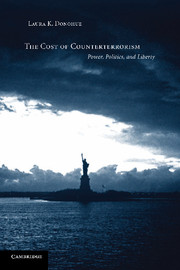5 - Terrorist Speech and Free Expression
Published online by Cambridge University Press: 29 June 2009
Summary
“Congress shall make no law … abridging the freedom of speech, or of the press.”
US Constitution, First Amendment“Islamic governments … are established as they [always] have been by pen and gun[,] by word and bullet[,] by tongue and teeth.”
Al Qaeda Manual“Everyone has the right to freedom of expression. This right shall include freedom to hold opinions and to receive and impart information and ideas without interference by public authority. … The exercise of these freedoms, since it carries with it duties and responsibilities, may be subject to such formalities, conditions, restrictions or penalties as are prescribed by law and are necessary in a democratic society, in the interests of national security, territorial integrity or public safety, for the prevention of disorder or crime…”
European Convention on Human Rights, Article 10“When you had a bomb outrage, and there are pictures of bodies [shown] to distressed and weeping relatives, and the next thing that happens on the screen, in people's living rooms, is somebody saying, ‘I support the armed struggle’ or ‘They deserved it’ – that I think is not only offensive, but it's wrong and it's perfectly reasonable to remove that.”
Douglas Hurd, UK Home Secretary, 1988“A person is guilty of an offence if he (a) uses threatening, abusive or insulting words or behaviour, or disorderly behaviour, or (b) displays any writing, sign or other visible representation which is threatening, abusive or insulting, within the hearing or sight of a person likely to be caused harassment, alarm or distress thereby.”
UK Public Order Act, 1986Information
- Type
- Chapter
- Information
- The Cost of CounterterrorismPower, Politics, and Liberty, pp. 273 - 332Publisher: Cambridge University PressPrint publication year: 2008
Accessibility standard: Unknown
- 2
- Cited by
